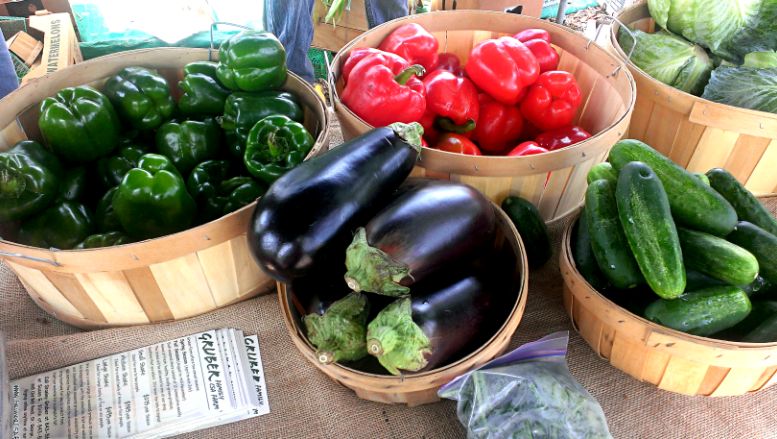Fit Beaufort: Spring clean your diet
 By Hannah Cordill | Dieting is everywhere these days. You can’t turn on the television or open yahoo on your computer without seeing an ad for some quick fix or easy method to lose weight. We are bombarded with wraps, pills, potions, and interesting contraptions with huge promises, many that are really unsafe.
By Hannah Cordill | Dieting is everywhere these days. You can’t turn on the television or open yahoo on your computer without seeing an ad for some quick fix or easy method to lose weight. We are bombarded with wraps, pills, potions, and interesting contraptions with huge promises, many that are really unsafe.
How can we work towards living a healthy lifestyle without turning to one of these enticing products? It’s really pretty simple. We need to fuel our bodies with whole, real foods. Most foods the average person consumes are processed, manufactured, filled with additives and preservatives and chemically altered so it tastes good and we go back for more. But what those foods are doing to our bodies is scary. Heart disease, diabetes, and cancer is on the rise and one of the possible causes is from the foods we eat. It’s time to take a serious look at our diets and make some healthy choices on a daily basis.
So where do we start? Here are some simple tips on eating a whole food diet. Remember you don’t have to change everything at once. That can be very overwhelming and lead to frustration, which usually causes us to give up. Take this slow and begin to really commit to eating a diet that will help you feel good.
Eat to live, don’t live to eat.
Having a certain mindset about how you are fueling your body is a great place to start. Often times, food is in the front of our minds throughout the day, always thinking about what snack to have, unconsciously grabbing a handful of m&ms to throw in our mouths, grabbing fast food on the way home from work. But I challenge you to be intentional with your eating habits. Become more aware of what you are putting in your mouth and how it makes you feel. Don’t shape your day around your meals and snacks. Shape your day around living a full life and add meals in to support that. Take time to enjoy your meals, savor the flavors, linger over a meal with good friends and family.
Clean up your diet.
The idea of clean eating is a pretty broad one. Some people go all in and are really strict about what they consume, while others follow it a bit more loosely. In general, try to stick with eating foods as close to their natural state as possible. This means filling your diet with fruits and vegetables, whole grains, legumes, and lean meats. These foods ensure that our bodies will get the nutrition it needs to function at its best. This can start out simple. Swap out your white rice for brown rice, white pasta or bread for whole grain, a side of fries for a sweet potato, a bag of chips for a piece of fruit. One of my favorite ways to know what a whole food is, is to take a stroll through the Port Royal Farmer’s Market. From fresh seasonal fruits and veggies and local meats to fresh baked sprouted breads and local honey, it is filled with ideal options.
 Another way to consider it is sticking to the perimeter at the grocery store. If you walk into Publix and fill your cart with foods from the outside perimeter of the store, chances are you will be eating pretty well. This would include the produce department, back to the meat and seafood counter, heading straight to dairy. Grab a few pantry items from the aisles and staples from the bakery or frozen foods and you are set for the week.
Another way to consider it is sticking to the perimeter at the grocery store. If you walk into Publix and fill your cart with foods from the outside perimeter of the store, chances are you will be eating pretty well. This would include the produce department, back to the meat and seafood counter, heading straight to dairy. Grab a few pantry items from the aisles and staples from the bakery or frozen foods and you are set for the week.
When you fill up your body with real food, you will stop craving sugar and empty calories because your body is getting what it needs to function. You are getting your fill of natural protein, carbohydrates and fats so your body tells you to stop eating sooner than if you were consuming processed foods. Again, it takes time to adjust but when you have more energy and feel better throughout the day, you will see why it is important to make these small changes.
You don’t have to spend a fortune to eat well.
In the ideal world, we would all consume locally grown and raised organic fruits, vegetables and meats. But there is a cost that is associated with that. Certainly if you can afford it, I would encourage you to eat that way. However, there are plenty of options for those on a budget. Frozen fruits and vegetables retain much of their ideal nutrients, often even better than fresh, because they are frozen right after being picked. They are often much more affordable as well. While organic, grass fed meats are ideal, you are still doing well choosing meats from animals not treated with antibiotics. Often you can buy a bag of frozen chicken breasts that fit this for much less than fresh chicken. Also, consider buying cheaper pieces of beef or a whole chicken. It’s simple to cook in the crock pot and the bones can be used to make a wonderful bone broth. We also make a monthly trip to Costco in Charleston to stock up on staples in bulk.
Meal planning and prep is another important step.
By having your week planned out and having whole foods ready to go, you are less likely to grab a bag of chips or a donut to snack on. Take the time over the weekend to plan out what you are going to eat for each meal throughout the week and stick closely to the plan. Then prep food ahead of time to ensure you aren’t overwhelmed during meal time. Some of my favorite foods to have on hand are hard boiled eggs, sliced veggies and a mix of raw nuts for snacks and quinoa, brown rice, sweet potatoes and tomato sauce for dinner. Prep these things over the weekend and you are setting yourself up for a healthy week.
 Learn to read nutrition labels.
Learn to read nutrition labels.
Generally you can skip the top part that tells you how many calories are in a serving, the breakdown of protein, carbs and fats and how many vitamins it contains. The important part is below that, where you learn about the ingredients. You want to be able to recognize all of these ingredients. For example, peanut butter that simple contains dry roasted peanuts is clean. Peanut butter than contains ten additional ingredients is not clean. You want to chose foods with a short and recognizable list.
Lastly, remember this is a lifestyle. Adjusting to a new lifestyle takes time and patience. Allow yourself treats occasionally without feeling guilty. Having a resistive diet often leads to resentment and feelings of guilt when you stray, and that is not the point. If you stick with the 80/20 rule, which means eating whole foods 80% of the time and allowing for some intentional treats, you are more likely to stick with your plan, make it a lifestyle and see results in both your health and your waistline.
-Hannah
See lots more of Hannah’s ideas, tips, recipes and more over on her blog at Nourish Life Fitness.







